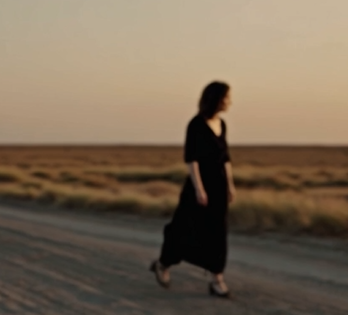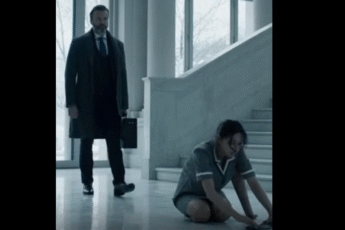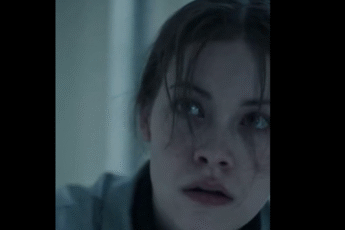The funeral was a masterpiece of performative grief. Held in the cavernous, cold expanse of the suburban New York mansion Dr. Richard Thompson had built as a monument to himself, it felt less like a farewell and more like a final assertion of his power. Lilies, funereal and cloyingly sweet, suffocated the air, their scent clinging to the heavy velvet drapes.
Helen Thompson, fifty-five, moved through the crowd like a ghost haunting her own life. Dressed in a severe black dress that Richard would have approved of, she was a study in practiced stillness. Her face, a mask of quiet sorrow, revealed none of the tectonic shifts happening beneath the surface. She accepted condolences with a slight nod, a whispered “thank you,” her eyes vacant.
Her son, Michael, thirty, was his father’s son in every way. He managed the scene with chilling efficiency, his hand a firm, proprietary weight on his mother’s arm. He steered her from one sympathetic guest to another, his voice a perfect calibration of filial devotion. But his eyes, cold and assessing, were already calculating the future, tallying assets and liabilities. His mother, he had long decided, was firmly in the latter column.
Richard was spoken of in hushed, reverent tones. “A titan of medicine,” one colleague said. “A pillar of the community,” murmured another. Helen remembered a different man. She recalled a short, sharp flashback from years ago: she had chosen a bright yellow sundress for a garden party. Richard had looked at it, his lip curling in disdain. “Are you a child, Helen? Go and change into something more appropriate. The navy blue. You are the wife of Dr. Thompson, not a canary.” His control was absolute, a cage built of quiet commands and financial dependency.
An old friend from college, a woman Helen hadn’t seen in years, broke through Michael’s cordon. “Helen, dear, if you need anything, anything at all…” she began, her eyes full of genuine warmth.
Before Helen could answer, Michael intervened, his smile tight. “Thank you for your kindness, Mrs. Albright. My mother is overcome with grief. She needs her rest now.” He was already leading Helen away, severing the connection, reinforcing the walls of her isolation.
Later, when the last of the black-clad mourners had drifted away and a profound silence fell upon the house, Helen found a moment alone. She moved to her late husband’s imposing mahogany desk. Her fingers, steady and sure, found a small, almost invisible catch on the underside. A hidden drawer slid open with a faint click.
Inside, nestled on a bed of velvet, was a small, old-fashioned brass key. It was not a key to any door in this house. She closed her hand around its cool metal form, her one, secret act of defiance in a house that was never her home. At that moment, the family lawyer approached, his expression a mixture of pity and professional duty. He handed a thick leather-bound folder to Michael. “Everything is in order,” he said, pointedly avoiding Helen’s gaze.
The air grew thick with unspoken things. The performance was over.
Michael closed the front door, the sound of the heavy lock clicking into place echoing the finality of the day. He turned to his mother, the mask of the grieving son dissolving to reveal the cold, hard features of his father.
MICHAEL: “Get your coat, Mother. I’m taking you somewhere safe. A place where you can rest properly.”
His voice was flat, devoid of any warmth. It was not a suggestion; it was a command. Helen looked at her son, at the man her husband had forged in his own image, and knew this was the moment she had been preparing for. There was no point in arguing. She nodded silently and retrieved her thin coat from the hall closet.
They drove in silence, leaving the manicured lawns and towering mansions of their neighborhood behind. The city lights bled into the rearview mirror and were replaced by the deepening gloom of the countryside. Michael drove with a single-minded focus, his hands gripping the wheel of the luxury sedan.
He turned off the main highway and onto a dark, unpaved road. The car bounced over ruts and gravel, the headlights cutting a lonely path through a tunnel of overgrown trees. He finally brought the car to a stop where the road seemed to dissolve into nothing but fields and darkness. The only sound was the idling engine and the chirping of crickets.
MICHAEL: “Get out of the car.” He didn’t look at her. He pressed the button that unlocked the doors.
Helen sat for a moment, her breath steady.
MICHAEL: “Dad’s will leaves everything to me, with a provision for your ‘care.’ But you’ve always been a liability, Mother. A weight. Consider this the final payment.”
He reached over, grabbed her handbag from the seat beside her, and tossed it out onto the dusty ground. It landed with a soft thud. He had already taken her phone and the cash from her wallet, she knew. He was leaving her with nothing.
He put the car in gear. For a fleeting second, Helen saw a flicker of something in his eyes—doubt, perhaps, or a shred of conscience. But it was gone as quickly as it appeared, extinguished by a lifetime of his father’s teachings. He drove away without a backward glance, the red taillights shrinking into the distance until they were swallowed by the night.
A plume of dust, smelling of dry earth, settled around her.
The car was gone. The world fell into an almost absolute silence, profound and unnervingly peaceful. Helen stood alone on the deserted road, a solitary figure under a vast, star-dusted sky. She looked down at her pale, empty hands, the hands that had served a husband and raised a son, and then she looked up at the boundless night.
A smile, slow and genuine, spread across her lips. It was a foreign feeling, an old muscle stirring from a long slumber. A single tear traced a path through the road dust on her cheek, followed by another, and then another. They were not tears of fear or despair. They were tears of pure, unadulterated relief. The cage door had finally swung open.
She was not afraid. She was ready.
With a newfound purpose, she began to walk. Her steps were not the hesitant shuffle of a victim, but the firm, determined stride of a woman on a mission. The gravel crunched rhythmically under her sensible shoes. After a mile, just as she had memorized from the maps she had studied for years, she reached a crossroads marked by a dilapidated, long-forgotten bus shelter.
She ran her hand under the cold, splintered wood of the bench. Her fingers found a small, waterproof package, secured with heavy-duty tape. Her survival cache. With practiced ease, she tore it open. Inside was a simple, pre-paid burner phone, a bundle of cash, a set of new identification cards, and a bus ticket. Everything she needed.
She switched on the phone. It came to life with a cheerful beep, a sound of promise. She dialed the only number she had saved. It rang twice before a familiar voice answered.
HELEN: “Sarah? It’s me. It happened. I’m at the rendezvous point.”
There was a pause on the other end, then her sister’s voice, filled with a mixture of concern and steely resolve. “I’ve been waiting for your call. Are you alright?”
“I’m more than alright,” Helen said, her voice clear and strong. “I’m free.”
An hour later, the distant headlights of a late-night bus appeared, a beacon in the darkness. It groaned to a stop for its lone passenger. As Helen stepped aboard, she didn’t look back at the dark road from which she had come. She was already focused on the road ahead. She spent the night in a clean, anonymous motel hundreds of miles away, sleeping more soundly than she had in thirty years
A week later, the scene was starkly different. Helen sat in a bright, modern law office in a different state. The muted tones of mourning were gone, replaced by a simple but elegant business suit that radiated a quiet confidence she had never been allowed to wear. Across the polished table sat her new lawyer, a sharp, no-nonsense woman named Ms. Albright.
On a large screen in front of them, the face of Michael’s lawyer, a smug man named Mr. Davies, materialized via video call. Michael was visible beside him, his expression one of bored impatience. He believed this was a mere formality, a nuisance to be dealt with before he could fully claim his inheritance.
Mr. Davies began, his voice dripping with condescension. “As you are aware, my client, Mr. Thompson, is the sole heir to his father’s estate. We are, however, prepared to offer a minimal spousal stipend to Mrs. Thompson, out of respect for her… situation.”
Ms. Albright offered a thin, unimpressed smile. “We are not here to discuss a stipend, Mr. Davies. We are here to discuss Dr. Richard Thompson’s undeclared assets.”
The smug look on Davies’ face faltered slightly. Michael leaned forward, a frown creasing his brow.
Ms. Albright slid a new, slim file across the table toward the camera’s view. “Specifically, three offshore accounts in Switzerland, with a combined value of approximately fourteen million dollars. Accounts to which my client, Mrs. Thompson, has complete and total access.”
The color drained from Michael’s face on the screen. He looked as if he’d been struck by lightning. He stared, speechless, his mouth slightly agape.
For the first time, Helen spoke. Her voice was not the timid whisper her son was used to. It was clear, steady, and resonant with a power he had never imagined.
HELEN: “My husband was a meticulous man. But he was also arrogant. He saw me as a simpleton, someone to manage the household budget and nothing more. He never imagined that while I was balancing his checkbooks, I would find his private ledger.”
She leaned forward, her eyes locking onto her son’s through the cold lens of the camera. “You had a choice, Michael. You could have had a mother and half of a fortune you never knew existed. Instead, you chose a tax investigation.
“Unless we come to a… new arrangement,” Helen continued, her voice like ice, “my lawyer will forward this entire file to the IRS at the close of business today. Your father’s legacy, and your inheritance, will be buried in audits and federal charges for years. Your choice.”
The feed was silent. Michael’s perfectly constructed world had just been leveled by the woman he had dismissed as a ghost.
The aftermath was swift and brutal. The video call ended abruptly, but not before Helen saw the look of pure, unadulterated panic on her son’s face. He was trapped. To fight his mother would be to expose his father—and himself—to financial ruin and criminal prosecution. The power had shifted completely, irrevocably.
A series of frantic calls between lawyers followed. The blustering condescension from Michael’s side was replaced by desperate attempts at negotiation. But Helen’s position was absolute. She was not negotiating; she was dictating terms.
A week later, they met to sign the papers. Michael was a shadow of his former self. The arrogance was gone, replaced by a sullen, bitter resentment. He refused to look at his mother, his eyes fixed on the documents that would sign away the vast majority of his perceived birthright. He received only a small fraction of the total fortune, enough to live comfortably but not enough to wield the kind of power he craved.
His real punishment was not the loss of money, but the shattering of his own ego. He had been outmaneuvered, out-planned, and utterly defeated by the person he considered his inferior. He would live the rest of his life knowing that he had thrown away not only a fortune, but also the last family connection he had, all for a final, cruel act of dominance that had backfired spectacularly.
Helen, for her part, felt no triumph in his defeat, only a quiet sense of justice. She signed her name with a firm, steady hand. Once the ink was dry, she walked out of the law office and did not look back. She wasn’t seeking revenge. She was seeking a life. With her rightful share of the fortune secured, she vanished, leaving the name Helen Thompson and the ghost of her past life behind forever.
One year later.
A small, sun-drenched house stood peacefully on the coast of Oregon, overlooking the endless expanse of the Pacific Ocean. The air was crisp with the scent of salt and pine. In the garden, a woman was tending to her roses, her hands covered in rich soil. She looked healthy, happy, and decades younger than the ghost who had haunted a funeral a year ago. She went by her maiden name now: Helen Carter.
Her phone rang, and she answered with a bright, easy smile. It was her sister, Sarah, the keeper of her survival cache and the silent partner in her long-planned escape.
“You’re not going to believe the size of the zucchini in my garden,” Helen laughed, the sound as free and open as the ocean breeze. “I’m thinking of entering it in the county fair.”
They chatted for a long time, their conversation filled with the easy intimacy of family, making plans for a trip to Italy in the spring. There was no talk of the past, no mention of Richard or Michael. They were footnotes in a book that was now closed.
Later that evening, as the sun began to dip below the horizon, painting the sky in fiery strokes of orange and purple, Helen walked alone on the beach. The waves washed over the sand, erasing her footprints almost as soon as she made them.
She was no longer someone’s wife or someone’s mother. She was simply Helen. She looked out at the vast, open ocean, a world of possibility stretching out before her. She took a deep breath of the clean, cool air, and she smiled. For the first time, the future was entirely her own.






